美西战争
美西战争爆发原因是什么

美西战争爆发原因是什么美西战争爆发于1898年4月21日,是美国为夺取西班牙属地古巴、波多黎各和菲律宾而发动的战争,是一场列强重新瓜分世界的战争。
以下是店铺为你精心整理的美西战争爆发原因,希望你喜欢。
美西战争爆发原因1、随着经济实力的增长美国看上了西班牙属地古巴、波多黎各和菲律宾,决定动用武力夺取心仪之地是直接原因2、美国作为新兴资本主义经济强国急求谋取海外殖民地,其殖民地数量和其经济实力出现倒挂现象;3、战争实质为列强重新瓜分殖民地,反映出当时帝国主义经济发展不平衡的渊源背景,这是推动美西战争爆发的时代因素;4、19世纪末,美国进入了帝国主义时期,时任总统的麦金莱改变以前的对外政策,积极对外扩张,任命杜威为司令发动对外扩张战争,这是美西战争爆发的主观因素。
美西战争西班牙失败的原因当时的新兴美国经济雄厚,极具军事潜力,西班牙也已衰弱,被各国孤立,已是一个实实在在的老朽帝国。
国内政权频繁的更替,革命运动亦是常事,全国上下无法团结一心,共同对外。
身为沿海国家,连海军的炮手都无法充分训练,战舰的设计也是十分不堪,海军实力实在是远不如从前了。
再说美国,美国大肆扩充海军,经常进行航海训练,海军实力甚是可观。
两国开战,谁输谁赢已经非常明显了。
美西战争背景19世纪末,美国进入了帝国主义时期。
美国垄断资本财团迫切需要开辟新的市场、投资场所和原料产地,于是各种宣传机器大造对外扩张的舆论。
但是正当美国准备向海外扩张时,整个世界已为老牌殖民大国瓜分完毕。
美国想重新瓜分世界殖民地,但因力量有限,还无力同英法等国相抗衡,只有老朽帝国西班牙是个好目标。
这时的西班牙已是日薄西山,昔日的庞大帝国仅剩下古巴、波多黎各和亚洲的菲律宾。
美国决定首先拿西班牙开刀,夺取这几个西班牙殖民地,以便控制中美洲和加勒比地区,并取得向远东和亚洲扩张的基地。
这时,西属殖民地人民的斗争也给美国创造了有利环境。
菲律宾和古巴先后爆发了反对西班牙殖民统治的武装起义。
美西战争

圣地亚哥战役 7月3日,美军在古巴圣地亚哥港彻底击溃西班牙海军上将所率领的西班牙加勒比海舰队,“3 个世纪以前西班牙无敌舰队被英国击败以来,衰败中的西班牙帝国海军力量又受到了一次致命的打击。” 如马 尼拉战役一样,伤亡是单方面的:474名西班牙人死伤,1750名被俘,而美国人却只有一人死亡,一人受伤。
19世纪末,古巴和菲律宾两地人民反对西班牙殖民统治的武装斗争,牵制着大量西班牙军队。西班牙军对古 巴起义者的残酷镇压激怒了美国人民,并危及美国资本家在该地的经济利益。1898年2月15日,美国派往古巴护 侨的军舰缅因号在哈瓦那港爆炸,美国遂以此事件为借口。要求惩罚西班牙,4月24日西班牙首先对美国宣战, 次日4月25日美国对西班牙宣战。最终西班牙请求停战,美国获胜。这次战争使美国获取了重要的经济利益,又 使美国获取了分别向南美洲和亚洲扩张的战略基地的古巴岛和菲律宾群岛。
1896年,西班牙派总督瓦莱里亚诺·维勒尔-尼古拉乌(Governor-General Valeriano Weyler y Nicolau) 到古巴去镇压起义。这是个完全冷酷无情的人,他强迫50多万古巴人从家里搬出来,把他们塞进破旧简陋没有卫 生设备的营房居住。大约有20万古巴人死在集中营中,而维勒尔-尼古拉乌得到了“屠夫”的头衔。
古巴战区
菲律宾战区
在 美 国 对 西 班 牙 开 战 之 前 紧 张 的 几 个 星 期 里 , 当 时 的 代 理 海 军 部 长 西 奥 多 ·罗 斯 福 愉 快 地 遵 循 麦 金 利 的 命 令 , 并发电报给他的朋友美国亚洲舰队的海军准将乔治·杜威(Commodore George Deway):”上足了煤,在向西 班牙宣战时,你的任务就是要监视西班牙舰队不离开亚州海岸,然后在菲律宾群岛展开攻击。“ 杜威把舰队集 结在香港待命随时准备按照战前计划歼灭驻菲的西班牙舰队,然后配合陆军和菲律宾军队攻占菲律宾。
世界现代史名词解释

世界现代史名词解释:1.美西战争:美西战争是1898年,为夺取属地、和而发动的战争,是列强重新瓜分的第一次战争。
和既有重要的价值,又是分别向和扩张的。
新兴的拥有雄厚的、军事潜力,已建立起一支较强大的。
2.门户开放政策:在整个范围,列强都有进行贸易的权利。
它的主要精神是利益均沾,机会平等。
不论是在哪个列强的内,不论是否在或都实行这个原则。
是美国侵华行动的“里程碑”。
受到列强的普遍欢迎,由此而使得列强在侵华步骤上取得暂时的一致。
避免了列强因在华利益的相互抵触而使得列强间本以十分尖锐的矛盾进一步激化。
也由此而使得列强由争夺在华利益而转化为在这个问题上相互合作。
3.日俄战争:是指1904年2月,与为了侵占东北和,在中国东北的土地上进行的一场战争。
以沙皇俄国的失败而告终。
日俄战争促成日本在东北亚取得军事优势,并取得在、中国东北驻军的权利,令俄国于此的扩张受到阻挠。
日俄战争的陆上战场是清朝本土的,而清朝政府却被逼迫宣布中立,甚至为这场战争专门划出了一块交战区。
日、俄、中(清)三方在这场中都蒙受到了严重损失,并为之后各国的发展道路造成了一定的影响。
4.三国同盟:这是第一次世界大战时帝国主义列强结成的军事与政治集团。
1879年,德国、奥匈帝国为了对抗俄国与法国缔结军事同盟条约。
1882年意大利加入,三国同盟正式形成。
三国同盟的目标直接对准法国。
后意大利于1915年脱离同盟国集团,转而加入协约国集团。
同年,保加利亚与土耳其则相继加入同盟国。
1918年11月,同盟国集团在与协约国的军事战争中失败,最终随着德国的战败,同盟国集团瓦解。
5.三国协约:第一次世界大战期间与三国同盟相对抗的帝国主义集团,由英、法、俄三国于1904—1907年期间签订一系列协议而组成。
1893年为抗衡德、意同盟,法俄首先签订军事协定。
面临日益增长的德国威胁,英法调整在殖民地上的矛盾,于1904年签订英法协约。
随后在日俄战争中遭到失败的俄国为了摆脱自己的困境,也于1907年和英国签订英俄协约。
美西战争名词解释

美西战争名词解释美西战争是美国历史上重要的一次战争,此次战争的胜利不仅确立了美国作为世界强国的地位,也开启了美国国内的社会变革。
在这场战争中,涉及到许多重要的名词和概念,下面将分别进行解释。
1. 西班牙帝国西班牙帝国是指西班牙政府在16世纪至19世纪期间建立的一个具有广泛领土的大帝国。
在美西战争期间,西班牙仍然拥有美国的菲律宾,波多黎各和古巴等殖民地。
2. 《马尼拉湾报告》《马尼拉湾报告》是美国海军准将杜威在1898年5月1日对西班牙舰队进行的突袭行动的一份报告。
此次突袭行动成功摧毁了西班牙舰队,为美国在美西战争的胜利奠定了基础。
3. 过度期过度期是指美国政府在1846年颁布的一个法案,该法案允许美国陆军向西部派遣士兵,但要求他们要保持“防御性质”。
这个法案被解读为允许美国在西班牙-美国战争中使用武力。
4. 群岛政策群岛政策是指美国政府在1898年宣布的一项政策,该政策将美国作为一个强大的殖民帝国,并提出了将菲律宾、波多黎各和古巴等地区作为美国的殖民地的计划。
5. 洲际铁路洲际铁路是19世纪美国西部扩张的一个重要标志。
美国政府通过政策鼓励铁路的建设,使得西部地区的开垦和开发变得更加容易。
6. 民粹主义民粹主义是19世纪美国政治运动的一个名称,该运动主张政府应该更加关注农民和劳工阶层,同时反对财阀和大公司的垄断。
在美西战争中,民粹主义者对战争和美国外交政策持批评态度。
7. 邦联邦联是美国南方在内战期间建立的一个政治组织。
邦联政府反对奴隶制度的废除,并试图通过武装起义保护其利益。
在美西战争中,邦联政府的支持者主张支持西班牙,并认为美国参与战争是荒唐的。
8. 黄龙带黄龙带是中国一条重要的自然景观线路,其穿越的地区包括了许多重要的历史遗址和文化景观。
在美西战争期间,黄龙带对美国角色发挥了一定的影响,其中九寨沟和黄龙景区就曾一度被美国海军占领。
9. 资本主义资本主义是19世纪后半叶至20世纪初期美国社会和经济发展的主要趋势。
美西战争的胜利者是谁

美西战争的胜利者是谁美西战争是1898年,美国为夺取西班牙属地古巴、波多黎各和菲律宾而发动的战争,是列强重新瓜分殖民地的第一次帝国主义战争。
下面是店铺为大家整理的美西战争的胜利者是谁,希望大家喜欢!美西战争的胜利者爆发在公元1898年的那场美西战争,是美国为了夺取西班牙的属地,古巴,波多黎各和菲律宾,而发动的战争。
这是帝国主义列强之间,再一次为了瓜分殖民地而引发的战争。
那么,美西战争最后谁胜利了呢?关于美西战争最后谁胜利了这个问题还要从战争本身开始说起。
这场战争,虽然是强强对话,但战争开始后,却呈现了一边倒的趋势,美国没用多长时间,就赢得了战争。
而整个战争期间,美国军兵的死亡人数共有五千人,但其中只有四百人是战死沙场的,其余的则是因伤病而死。
美国用很小的代价,就得到了最重要的海外殖民地,也把西班牙从古巴的土地上赶了出去。
古巴在美国的帮助下,成为了独立的国家,但实际上古巴已在美国的控制之下。
另一方面,美国仅用2000万美元的象征性抵偿,就获得了菲律宾这块重要的海外殖民地,对美国而言,菲律宾的经济价值和军事战略价值都极为重要。
在战争中,美国也锻炼了陆军和海军的配合作战能力。
因为美国海军的实力相当高,战术素养也令人羡慕,但美国陆军的能力还很不足,与海军在协同作战中,配合也很差。
但经过这场战争,美国吸取了经验教训,在战后,美国进一步加强了海军和陆军的协同作战能力的培训和演练,这也为美国在以后的战争中打下了坚实的基础。
从以上各种情况来分析,美西战争,美国以完胜西班牙结束。
美西战争时间美西战争,其实也就是美国和西班牙发生的战争,这场战争发生的原因是在19世纪末期,美国进入了帝国主义社会。
因而,美国需要快速的发展各类行业,需要建设大量的原材料生产以及原材料加工的场所,所以,美国的土地根本就不够。
故而美国想到了对外扩张的方法。
但是由于美国当时的国力不行,无法和英国等欧洲大国相对抗,所以,就把目标放在了西班牙这个经受几次战争已经变成小国的国家。
关于美西战争的书

关于美西战争的书美西战争是19世纪末美国与西班牙之间的一场冲突,它在美国历史上具有重要意义。
本文将通过回顾该战争的背景、原因、战斗过程和结果,探讨这场战争对美国及其国家地位的影响。
背景19世纪末,美国展示了它在工业、经济和政治方面的强大实力。
美国扩张势力到西部,将目光投向了海外。
与此同时,西班牙对其殖民地美洲及太平洋地区的控制开始出现动摇。
原因美国参与美西战争的原因是多方面的。
首先,美国对古巴情况的关注。
19世纪90年代,古巴爆发了一场起义,受到西班牙殖民地政府的残酷镇压。
美国的报纸开始大肆渲染这一事件,激起了美国公众对古巴的同情和愤怒。
其次,美国对于自身在加勒比地区的影响力的保护。
美国的商业利益使其对加勒比地区的稳定非常关切,而西班牙对该地区的殖民统治使其不稳定。
此外,美国从西班牙殖民统治下解放出来的国家如菲律宾和波多黎各也寻求美国的保护。
战斗过程美西战争自1898年4月开始,持续到同年8月。
战争在菲律宾群岛爆发,美国海军于5月摧毁了西班牙舰队。
然后美军转战到古巴,实施了一系列军事行动,最终在7月攻陷了圣地亚哥。
同时,美国还在夏威夷岛上建立了军事基地。
结果美国在战争中获得了决定性的胜利。
根据巴黎和约,西班牙放弃对古巴、波多黎各和菲律宾的主权。
此外,美国还从西班牙购买了关岛和波多黎各。
通过这场战争,美国变得更加自信和强大,成为一个世界大国。
影响美西战争对美国及其国家地位产生了深远影响。
首先,它标志着美国成为世界舞台上的重要角色。
通过该战争,美国展示了其军事实力和决心,确立了其在拉丁美洲和太平洋地区的影响力。
其次,美国在菲律宾的殖民统治引发了争议。
许多美国人反对将菲律宾视为殖民地,这引发了一场关于美国帝国主义的辩论。
此外,美西战争还加速了美国的军事现代化。
战争期间,美国采用了新技术和战术,这在接下来的几十年里成为美国军队的重要特征。
结论美西战争是一场具有重要历史意义的战争,对美国及其国家地位产生了深远影响。
世界现代史名词解释

世界现代史名词解释This model paper was revised by the Standardization Office on December 10, 2020世界现代史名词解释:1.美西战争:美西战争是1898年,为夺取属地、和而发动的战争,是列强重新瓜分的第一次战争。
和既有重要的价值,又是分别向和扩张的。
新兴的拥有雄厚的、军事潜力,已建立起一支较强大的。
2.门户开放政策:在整个范围,列强都有进行贸易的权利。
它的主要精神是利益均沾,机会平等。
不论是在哪个列强的内,不论是否在或都实行这个原则。
是美国侵华行动的“里程碑”。
受到列强的普遍欢迎,由此而使得列强在侵华步骤上取得暂时的一致。
避免了列强因在华利益的相互抵触而使得列强间本以十分尖锐的矛盾进一步激化。
也由此而使得列强由争夺在华利益而转化为在这个问题上相互合作。
3.日俄战争:是指1904年2月,与为了侵占东北和,在中国东北的土地上进行的一场战争。
以沙皇俄国的失败而告终。
日俄战争促成日本在东北亚取得军事优势,并取得在、中国东北驻军的权利,令俄国于此的扩张受到阻挠。
日俄战争的陆上战场是清朝本土的,而清朝政府却被逼迫宣布中立,甚至为这场战争专门划出了一块交战区。
日、俄、中(清)三方在这场中都蒙受到了严重损失,并为之后各国的发展道路造成了一定的影响。
4.三国同盟:这是第一次世界大战时帝国主义列强结成的军事与政治集团。
1879年,德国、奥匈帝国为了对抗俄国与法国缔结军事同盟条约。
1882年意大利加入,三国同盟正式形成。
三国同盟的目标直接对准法国。
后意大利于1915年脱离同盟国集团,转而加入协约国集团。
同年,保加利亚与土耳其则相继加入同盟国。
1918年11月,同盟国集团在与协约国的军事战争中失败,最终随着德国的战败,同盟国集团瓦解。
5.三国协约:第一次世界大战期间与三国同盟相对抗的帝国主义集团,由英、法、俄三国于1904—1907年期间签订一系列协议而组成。
美西战争对美国的领土扩张影响
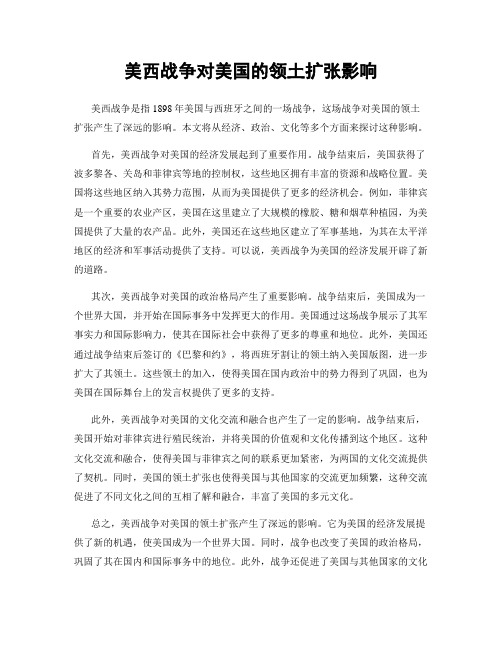
美西战争对美国的领土扩张影响美西战争是指1898年美国与西班牙之间的一场战争,这场战争对美国的领土扩张产生了深远的影响。
本文将从经济、政治、文化等多个方面来探讨这种影响。
首先,美西战争对美国的经济发展起到了重要作用。
战争结束后,美国获得了波多黎各、关岛和菲律宾等地的控制权,这些地区拥有丰富的资源和战略位置。
美国将这些地区纳入其势力范围,从而为美国提供了更多的经济机会。
例如,菲律宾是一个重要的农业产区,美国在这里建立了大规模的橡胶、糖和烟草种植园,为美国提供了大量的农产品。
此外,美国还在这些地区建立了军事基地,为其在太平洋地区的经济和军事活动提供了支持。
可以说,美西战争为美国的经济发展开辟了新的道路。
其次,美西战争对美国的政治格局产生了重要影响。
战争结束后,美国成为一个世界大国,并开始在国际事务中发挥更大的作用。
美国通过这场战争展示了其军事实力和国际影响力,使其在国际社会中获得了更多的尊重和地位。
此外,美国还通过战争结束后签订的《巴黎和约》,将西班牙割让的领土纳入美国版图,进一步扩大了其领土。
这些领土的加入,使得美国在国内政治中的势力得到了巩固,也为美国在国际舞台上的发言权提供了更多的支持。
此外,美西战争对美国的文化交流和融合也产生了一定的影响。
战争结束后,美国开始对菲律宾进行殖民统治,并将美国的价值观和文化传播到这个地区。
这种文化交流和融合,使得美国与菲律宾之间的联系更加紧密,为两国的文化交流提供了契机。
同时,美国的领土扩张也使得美国与其他国家的交流更加频繁,这种交流促进了不同文化之间的互相了解和融合,丰富了美国的多元文化。
总之,美西战争对美国的领土扩张产生了深远的影响。
它为美国的经济发展提供了新的机遇,使美国成为一个世界大国。
同时,战争也改变了美国的政治格局,巩固了其在国内和国际事务中的地位。
此外,战争还促进了美国与其他国家的文化交流和融合,丰富了美国的多元文化。
美西战争可以说是美国历史上一个重要的转折点,它不仅改变了美国的领土,也改变了美国的命运。
名词解释

萨拉热窝事件 1914年6月28日,奥匈帝国在其吞并不久的波斯尼亚邻近塞尔维亚的边境地区,进行军事演习,以塞尔维亚为假想敌人。6月28日是塞尔维亚和波斯尼亚联军在1389年被土耳其军队打败的日子,是塞尔维亚人民的国耻日。奥匈帝国演习选定在这一天是具有挑衅意义的。奥匈皇储斐迪南大公亲自检阅了这次演习,演习结束后,斐迪南大公返回萨拉热窝市区时,被塞尔维亚青年普林西普击中毙命。这就是著名的萨拉热窝事件。德、奥匈帝国立即以此作为发动战争的借口,挑起了第一次世界大战,这一事件遂成为第一次世界大战的导火线。
Байду номын сангаас门户开放 The Open Door:由美国首先提出来的。它的主要内容是:在整个中国范围,列强都有进行贸易的权利。它的主要精神是利益均沾,机会平等。不论是在哪个列强的势力范围内,不论是否在中国内地或沿海地区都实行这个原则。其目的在于在列强激烈竞争的条件下,为迟到者美国向中国扩展其政治经济
坦能堡战役Battle of Tannenberg 1914年坦能堡会战,又称为坦嫩贝格战役,是第一次世界大战东部战线的一次战役。这次战役是在1914年8月17日至9月2日爆发的。 在1914年8月17日,俄罗斯第一和第二军侵入东普鲁士,向首府哥尼斯堡进发。俄军成功地进入德国,直到德国第八军在8月20日反击。德军设计了一个陷阱,让由南向上的俄国第二军提前进入德国,但德军在后面反击它的补给线。在9月2日,俄军放弃了整个任务。俄军从坦能堡会战后,没有再向德国领土进攻。 虽然德军在坦能堡会战得胜,但德军原先并没有准备俄罗斯会在8月中开战,因此德军用了两支部队来抵抗俄军,造成德军的资源被分散,而影响在西线对英法联军的战事。
三国盟国:1879-1882,德意奥三国通过签订一系列协议而结成的军事集团。1879年,德奥缔结了针对俄国的秘密军事同盟条约。德国利用法意之间为争夺突尼斯而出现的矛盾,于1882年由德奥同意大利签订了三国同盟条约。三国同盟的主角是德国,它是导致第一次世界大战爆发的重要原因。
世界现代史复习资料(1)
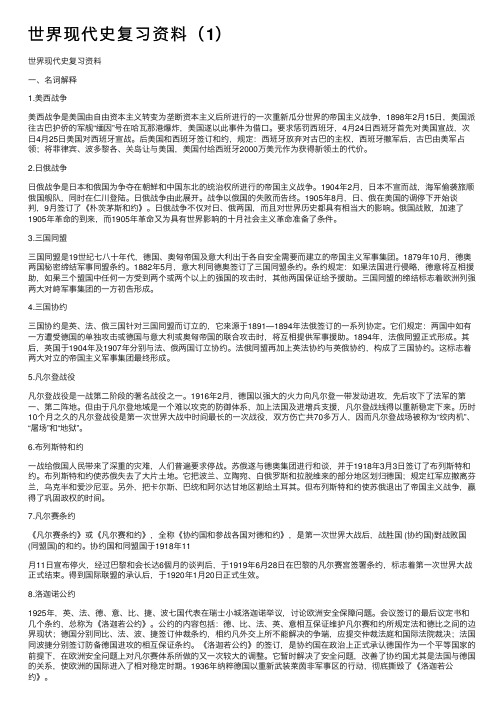
世界现代史复习资料(1)世界现代史复习资料⼀、名词解释1.美西战争美西战争是美国由⾃由资本主义转变为垄断资本主义后所进⾏的⼀次重新⽠分世界的帝国主义战争,1898年2⽉15⽇,美国派往古巴护侨的军舰“缅因”号在哈⽡那港爆炸,美国遂以此事件为借⼝。
要求惩罚西班⽛,4⽉24⽇西班⽛⾸先对美国宣战,次⽇4⽉25⽇美国对西班⽛宣战。
后美国和西班⽛签订和约,规定:西班⽛放弃对古巴的主权,西班⽛撤军后,古巴由美军占领;将菲律宾、波多黎各、关岛让与美国,美国付给西班⽛2000万美元作为获得新领⼟的代价。
2.⽇俄战争⽇俄战争是⽇本和俄国为争夺在朝鲜和中国东北的统治权所进⾏的帝国主义战争。
1904年2⽉,⽇本不宣⽽战,海军偷袭旅顺俄国舰队,同时在仁川登陆。
⽇俄战争由此展开。
战争以俄国的失败⽽告终。
1905年8⽉,⽇、俄在美国的调停下开始谈判,9⽉签订了《朴茨茅斯和约》。
⽇俄战争不仅对⽇、俄两国,⽽且对世界历史都具有相当⼤的影响。
俄国战败,加速了1905年⾰命的到来,⽽1905年⾰命⼜为具有世界影响的⼗⽉社会主义⾰命准备了条件。
3.三国同盟三国同盟是19世纪七⼋⼗年代,德国、奥匈帝国及意⼤利出于各⾃安全需要⽽建⽴的帝国主义军事集团。
1879年10⽉,德奥两国秘密缔结军事同盟条约。
1882年5⽉,意⼤利同德奥签订了三国同盟条约。
条约规定:如果法国进⾏侵略,德意将互相援助,如果三个盟国中任何⼀⽅受到两个或两个以上的强国的攻击时,其他两国保证给予援助。
三国同盟的缔结标志着欧洲列强两⼤对峙军事集团的⼀⽅初告形成。
4.三国协约三国协约是英、法、俄三国针对三国同盟⽽订⽴的,它来源于1891—1894年法俄签订的⼀系列协定。
它们规定:两国中如有⼀⽅遭受德国的单独攻击或德国与意⼤利或奥匈帝国的联合攻击时,将互相提供军事援助。
1894年,法俄同盟正式形成。
其后,英国于1904年及1907年分别与法、俄两国订⽴协约。
法俄同盟再加上英法协约与英俄协约,构成了三国协约。
美西战争对美国帝国主义崛起的影响
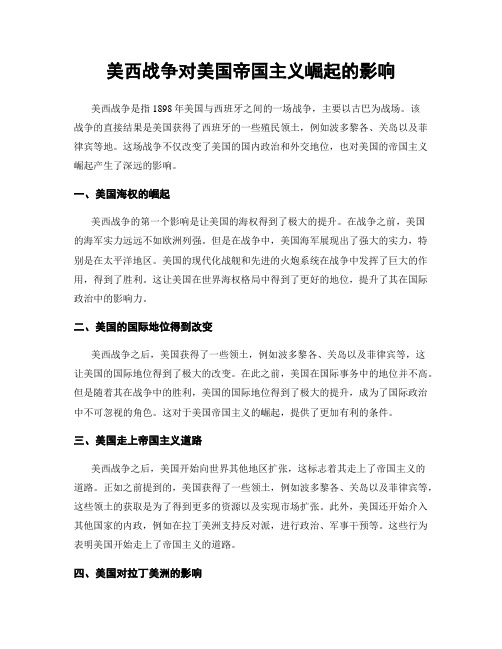
美西战争对美国帝国主义崛起的影响美西战争是指1898年美国与西班牙之间的一场战争,主要以古巴为战场。
该战争的直接结果是美国获得了西班牙的一些殖民领土,例如波多黎各、关岛以及菲律宾等地。
这场战争不仅改变了美国的国内政治和外交地位,也对美国的帝国主义崛起产生了深远的影响。
一、美国海权的崛起美西战争的第一个影响是让美国的海权得到了极大的提升。
在战争之前,美国的海军实力远远不如欧洲列强。
但是在战争中,美国海军展现出了强大的实力,特别是在太平洋地区。
美国的现代化战舰和先进的火炮系统在战争中发挥了巨大的作用,得到了胜利。
这让美国在世界海权格局中得到了更好的地位,提升了其在国际政治中的影响力。
二、美国的国际地位得到改变美西战争之后,美国获得了一些领土,例如波多黎各、关岛以及菲律宾等,这让美国的国际地位得到了极大的改变。
在此之前,美国在国际事务中的地位并不高。
但是随着其在战争中的胜利,美国的国际地位得到了极大的提升,成为了国际政治中不可忽视的角色。
这对于美国帝国主义的崛起,提供了更加有利的条件。
三、美国走上帝国主义道路美西战争之后,美国开始向世界其他地区扩张,这标志着其走上了帝国主义的道路。
正如之前提到的,美国获得了一些领土,例如波多黎各、关岛以及菲律宾等,这些领土的获取是为了得到更多的资源以及实现市场扩张。
此外,美国还开始介入其他国家的内政,例如在拉丁美洲支持反对派,进行政治、军事干预等。
这些行为表明美国开始走上了帝国主义的道路。
四、美国对拉丁美洲的影响在美西战争之后,美国对拉丁美洲的影响也变得更加深远。
此前,拉丁美洲在欧洲列强的殖民统治下,处于较为被动的地位。
但是在美国的带领下,拉丁美洲开始追求独立,建立自己的国家体系和文化。
同样的,美国的对于拉丁美洲的干预也使得该地区的国家开始反思自己的建设和发展道路。
而美国在拉丁美洲的势力扩张,也引发了当地居民的反感和反抗。
五、美国帝国主义的崛起及其对国内政治的影响美西战争标志着美国帝国主义的崛起。
美西战争

英国同荷兰移民后裔布尔人建立的南非共和国和奥兰治自由邦为争夺南非领土和地下资源而进行的一场战争。
又称南非战争、布尔战争。
英布战争是帝国主义时代到来的一个主要历史标志。
在帝国主义时代里,各列强首先对已分割的殖民地要求重新分割,继之以战争手段,进行疯狂的争夺。
扫苏联西南地区,逼近斯大林格勒;德国空军对苏联南部城市斯大林格勒的大规模轰炸行动;德军攻入市区;市区巷战;苏联红军反击;最终合围全歼轴心国部队。
轴心国一方在这场战役中损失了其在东线战场四分之一的兵力,并从此一蹶不振直至最终溃败。
对苏联一方而言,这场战役的胜利标志着收复沦陷领土的开始,最终迎来1945年5月对纳粹德国的最后胜利。
莫斯科会战作战图莫斯科会战(Moscow,Battle of)苏军于1941年9月30日~1942年4月20日为保卫莫斯科而进行的一系列防御战役和进攻战役。
1941年9月底,德军在苏德战场北翼封锁列宁格勒,在南翼占领基辅,在中央攻占斯摩棱斯克,打开了通向莫斯科的门户,距莫斯科仅300~400公里。
莫斯科成了双方斗争的焦点。
1940年9月13日一1943年5月13日第二次世界大战时期意大利和德国为一方,英美为另一方的武装力量之间为争夺重要战略地区和目标,争夺北非、近东和地中海的控制权,争夺殖民地而实施的军事行动。
西西里岛登陆战,是第二次世界大战期间,美英盟军于1943年7~8月在意大利西西里岛进行的一次大规模登陆作战。
此役,历时38天,歼灭德意军16.5万人,达成了攻占西西里岛,保证同盟国地中海航线畅通,并迫使墨索里尼下台、意大利投降的战役目的。
美西战争的名词解释
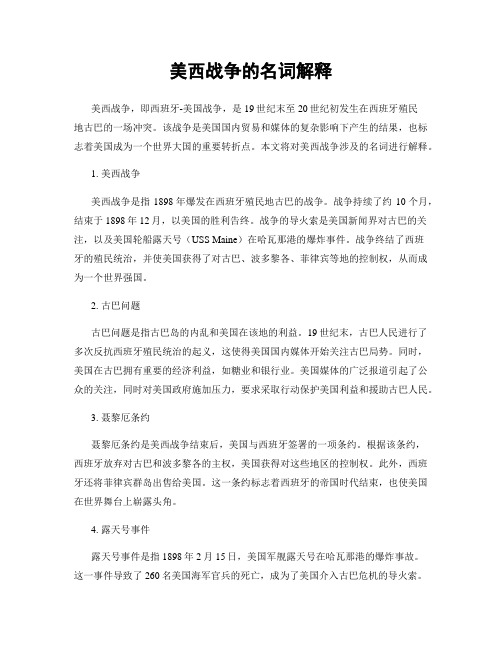
美西战争的名词解释美西战争,即西班牙-美国战争,是19世纪末至20世纪初发生在西班牙殖民地古巴的一场冲突。
该战争是美国国内贸易和媒体的复杂影响下产生的结果,也标志着美国成为一个世界大国的重要转折点。
本文将对美西战争涉及的名词进行解释。
1. 美西战争美西战争是指1898年爆发在西班牙殖民地古巴的战争。
战争持续了约10个月,结束于1898年12月,以美国的胜利告终。
战争的导火索是美国新闻界对古巴的关注,以及美国轮船露天号(USS Maine)在哈瓦那港的爆炸事件。
战争终结了西班牙的殖民统治,并使美国获得了对古巴、波多黎各、菲律宾等地的控制权,从而成为一个世界强国。
2. 古巴问题古巴问题是指古巴岛的内乱和美国在该地的利益。
19世纪末,古巴人民进行了多次反抗西班牙殖民统治的起义,这使得美国国内媒体开始关注古巴局势。
同时,美国在古巴拥有重要的经济利益,如糖业和银行业。
美国媒体的广泛报道引起了公众的关注,同时对美国政府施加压力,要求采取行动保护美国利益和援助古巴人民。
3. 聂黎厄条约聂黎厄条约是美西战争结束后,美国与西班牙签署的一项条约。
根据该条约,西班牙放弃对古巴和波多黎各的主权,美国获得对这些地区的控制权。
此外,西班牙还将菲律宾群岛出售给美国。
这一条约标志着西班牙的帝国时代结束,也使美国在世界舞台上崭露头角。
4. 露天号事件露天号事件是指1898年2月15日,美国军舰露天号在哈瓦那港的爆炸事故。
这一事件导致了260名美国海军官兵的死亡,成为了美国介入古巴危机的导火索。
当时,美国媒体广泛报道了这一事件,指责西班牙对美国舰只进行了袭击。
虽然后来调查显示爆炸可能是由船体内部的事故引起的,但这一事件激起了美国舆论的强烈情绪,成为美西战争爆发的重要因素之一。
5. 蒂勒尔岛战役蒂勒尔岛战役是美西战争中的一场重要战役,发生在菲律宾蒂勒尔岛。
该战役发生在1898年5月1日,由美国海军上将乔治·杜威指挥。
在这场战役中,美国舰队以超强的火力摧毁了西班牙舰队,取得了重大胜利。
美西战争的名词解释
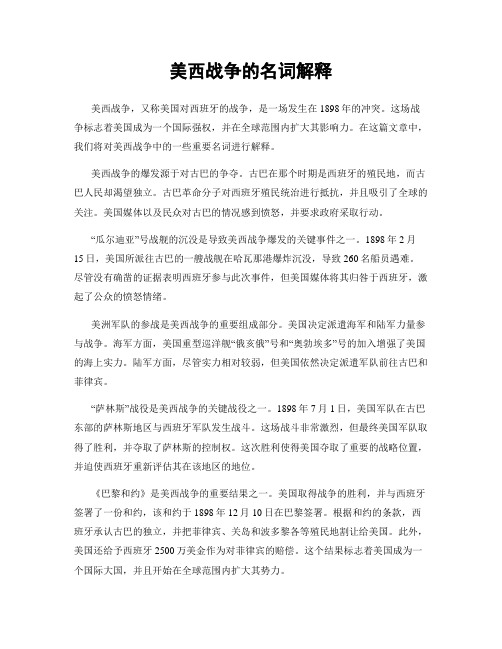
美西战争的名词解释美西战争,又称美国对西班牙的战争,是一场发生在1898年的冲突。
这场战争标志着美国成为一个国际强权,并在全球范围内扩大其影响力。
在这篇文章中,我们将对美西战争中的一些重要名词进行解释。
美西战争的爆发源于对古巴的争夺。
古巴在那个时期是西班牙的殖民地,而古巴人民却渴望独立。
古巴革命分子对西班牙殖民统治进行抵抗,并且吸引了全球的关注。
美国媒体以及民众对古巴的情况感到愤怒,并要求政府采取行动。
“瓜尔迪亚”号战舰的沉没是导致美西战争爆发的关键事件之一。
1898年2月15日,美国所派往古巴的一艘战舰在哈瓦那港爆炸沉没,导致260名船员遇难。
尽管没有确凿的证据表明西班牙参与此次事件,但美国媒体将其归咎于西班牙,激起了公众的愤怒情绪。
美洲军队的参战是美西战争的重要组成部分。
美国决定派遣海军和陆军力量参与战争。
海军方面,美国重型巡洋舰“俄亥俄”号和“奥勃埃多”号的加入增强了美国的海上实力。
陆军方面,尽管实力相对较弱,但美国依然决定派遣军队前往古巴和菲律宾。
“萨林斯”战役是美西战争的关键战役之一。
1898年7月1日,美国军队在古巴东部的萨林斯地区与西班牙军队发生战斗。
这场战斗非常激烈,但最终美国军队取得了胜利,并夺取了萨林斯的控制权。
这次胜利使得美国夺取了重要的战略位置,并迫使西班牙重新评估其在该地区的地位。
《巴黎和约》是美西战争的重要结果之一。
美国取得战争的胜利,并与西班牙签署了一份和约,该和约于1898年12月10日在巴黎签署。
根据和约的条款,西班牙承认古巴的独立,并把菲律宾、关岛和波多黎各等殖民地割让给美国。
此外,美国还给予西班牙2500万美金作为对菲律宾的赔偿。
这个结果标志着美国成为一个国际大国,并且开始在全球范围内扩大其势力。
美西战争对于美国的影响是深远的。
首先,它使得美国成为一个国际玩家。
通过战争的胜利,美国获得了全球的认可,并取得了在拉丁美洲和亚洲等地区的殖民地。
其次,美国媒体在战争中起到了重要的推动作用,其报道激起了公众的愤怒,并推动了政府采取行动。
美西战争的历史意义介绍
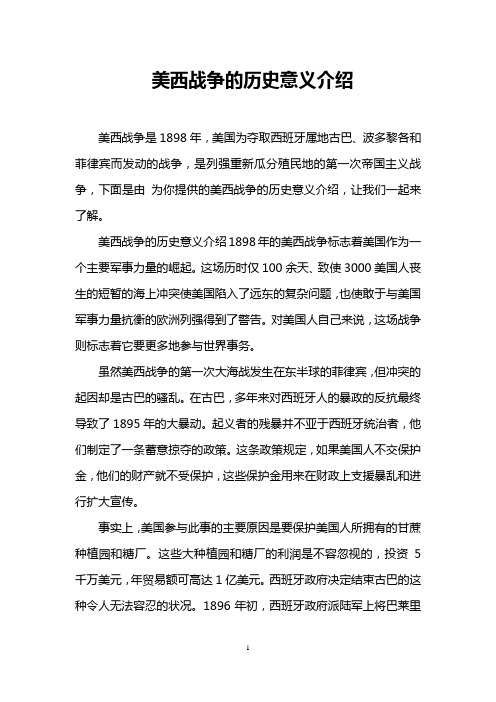
美西战争的历史意义介绍美西战争是1898年,美国为夺取西班牙属地古巴、波多黎各和菲律宾而发动的战争,是列强重新瓜分殖民地的第一次帝国主义战争,下面是由为你提供的美西战争的历史意义介绍,让我们一起来了解。
美西战争的历史意义介绍1898年的美西战争标志着美国作为一个主要军事力量的崛起。
这场历时仅100余天、致使3000美国人丧生的短暂的海上冲突使美国陷入了远东的复杂问题,也使敢于与美国军事力量抗衡的欧洲列强得到了警告。
对美国人自己来说,这场战争则标志着它要更多地参与世界事务。
虽然美西战争的第一次大海战发生在东半球的菲律宾,但冲突的起因却是古巴的骚乱。
在古巴,多年来对西班牙人的暴政的反抗最终导致了1895年的大暴动。
起义者的残暴并不亚于西班牙统治者,他们制定了一条蓄意掠夺的政策。
这条政策规定,如果美国人不交保护金,他们的财产就不受保护,这些保护金用来在财政上支援暴乱和进行扩大宣传。
事实上,美国参与此事的主要原因是要保护美国人所拥有的甘蔗种植园和糖厂。
这些大种植园和糖厂的利润是不容忽视的,投资5千万美元,年贸易额可高达1亿美元。
西班牙政府决定结束古巴的这种令人无法容忍的状况。
1896年初,西班牙政府派陆军上将巴莱里亚诺;韦莱尔去哈瓦那采取断然措施。
韦莱尔的办法就是把平民驱赶到集中区,使他们无法援助叛乱。
集中区里恶劣的卫生的条件使几千人丧生,其中大多数是妇女和儿童。
由于古巴叛乱政权在纽约进行巧妙的煽动,美国公众对“刽子手韦莱尔”的非人道做法反应强烈,有人要求马上承认叛乱“政府”。
作为对公众呼声的反应,国会通过了一项决议案,要求承认古巴叛乱政权。
反对帝国主义政策的克利夫兰总统认为,这一决议案是对他行政权力的干涉而不予理睬,他宣称拒绝出兵与西班牙开战;而另一方面,他又对西班牙政府明确表示,美国对西班牙在古巴的统治的尊重“将为更高的义务所代替,我们会毫不犹豫地承认和履行这种义务”。
1897年,西班牙新的自由党内阁召回了韦莱尔,放松了将平民驱赶到集中区的工作,并允许古巴人有一定程度的自主权。
美西战争对西班牙帝国的瓦解
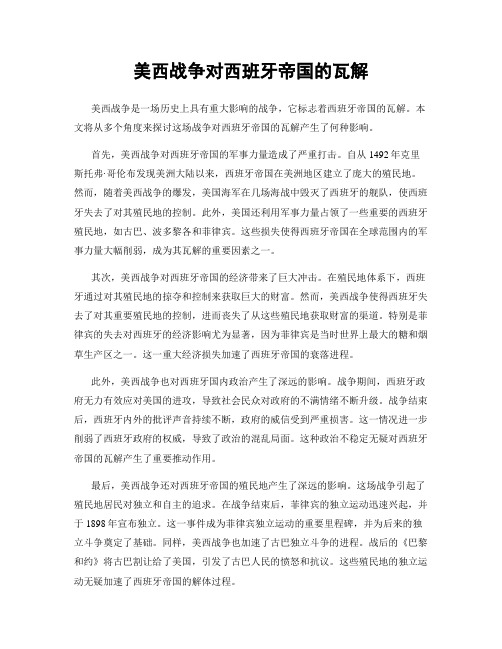
美西战争对西班牙帝国的瓦解美西战争是一场历史上具有重大影响的战争,它标志着西班牙帝国的瓦解。
本文将从多个角度来探讨这场战争对西班牙帝国的瓦解产生了何种影响。
首先,美西战争对西班牙帝国的军事力量造成了严重打击。
自从1492年克里斯托弗·哥伦布发现美洲大陆以来,西班牙帝国在美洲地区建立了庞大的殖民地。
然而,随着美西战争的爆发,美国海军在几场海战中毁灭了西班牙的舰队,使西班牙失去了对其殖民地的控制。
此外,美国还利用军事力量占领了一些重要的西班牙殖民地,如古巴、波多黎各和菲律宾。
这些损失使得西班牙帝国在全球范围内的军事力量大幅削弱,成为其瓦解的重要因素之一。
其次,美西战争对西班牙帝国的经济带来了巨大冲击。
在殖民地体系下,西班牙通过对其殖民地的掠夺和控制来获取巨大的财富。
然而,美西战争使得西班牙失去了对其重要殖民地的控制,进而丧失了从这些殖民地获取财富的渠道。
特别是菲律宾的失去对西班牙的经济影响尤为显著,因为菲律宾是当时世界上最大的糖和烟草生产区之一。
这一重大经济损失加速了西班牙帝国的衰落进程。
此外,美西战争也对西班牙国内政治产生了深远的影响。
战争期间,西班牙政府无力有效应对美国的进攻,导致社会民众对政府的不满情绪不断升级。
战争结束后,西班牙内外的批评声音持续不断,政府的威信受到严重损害。
这一情况进一步削弱了西班牙政府的权威,导致了政治的混乱局面。
这种政治不稳定无疑对西班牙帝国的瓦解产生了重要推动作用。
最后,美西战争还对西班牙帝国的殖民地产生了深远的影响。
这场战争引起了殖民地居民对独立和自主的追求。
在战争结束后,菲律宾的独立运动迅速兴起,并于1898年宣布独立。
这一事件成为菲律宾独立运动的重要里程碑,并为后来的独立斗争奠定了基础。
同样,美西战争也加速了古巴独立斗争的进程。
战后的《巴黎和约》将古巴割让给了美国,引发了古巴人民的愤怒和抗议。
这些殖民地的独立运动无疑加速了西班牙帝国的解体过程。
综上所述,美西战争对西班牙帝国的瓦解产生了多重影响。
美西战争简介

美西战争简介美西战争是列强重新瓜分殖民地的第一次帝国主义战争。
古巴和菲律宾群岛既有重要的经济价值,又是美国分别向南美洲和亚洲扩张的战略基地。
新兴的美国拥有雄厚的经济、军事潜力。
以下是店铺为你精心整理的美西战争简介,希望你喜欢。
美西战争分析中文名称:美西战争参战部队:美国、古巴、菲律宾,西班牙战争结果:美国获胜,古巴独立时间:1898年地点:古巴、加勒比海及太平洋人物:西奥多·罗斯福乔治·杜威美西战争详情1898年,美国为夺取西班牙属地古巴、波多黎各和菲律宾而发动战争,是列强重新瓜分殖民地的第一次帝国主义战争。
古巴和菲律宾既有重要的经济价值,又是美国向南美洲和亚洲扩张的战略基地。
新兴的美国拥有雄厚的经济、军事潜力,已建立起一支较强大的海军。
西班牙早已衰落,在国际上陷于孤立。
特别是古巴和菲律宾两地人民反对西班牙殖民统治的武装斗争,钳制着大量西班牙军队。
西班牙军对古巴起义者的残酷镇压激怒了美国人民,并危及美国资本家在该地的经济利益。
1898年2月15日,美国派往古巴护侨的军舰“缅因号”在哈瓦那港爆炸,美国遂以此事件为借口,于4月22日对西班牙采取军事行动。
早在战争爆发前夕,主持美海军工作的海军助理部长T.罗斯福即命令亚洲分舰队司令G.杜威率舰队集结香港待命,杜威进行了周密的作战准备。
1898年4月30日,美分舰队进入马尼拉湾,翌日晨,发现P.蒙托霍指挥的西舰队。
美西舰数对比为6:7,但美舰在总吨位、航速和火炮,特别是在战备训练水平方面,均占优势。
经数小时战斗,西舰队被歼,伤亡381人。
美方只有7人受伤。
与此同时,菲律宾起义军积极行动,控制着马尼拉外围(该地尚有一支西班牙驻军),占领了许多重要岛屿和城镇,并建立以E.阿奎纳尔多为首的民族政府。
8月13日新到的美陆军在舰队支援下登陆,同时利用菲律宾起义军,迫使马尼拉的西军投降。
但在废除西班牙殖民统治以后,美政府却背弃支持菲律宾独立的诺言,宣布对菲实行军事占领,引起菲人民的强烈反抗。
- 1、下载文档前请自行甄别文档内容的完整性,平台不提供额外的编辑、内容补充、找答案等附加服务。
- 2、"仅部分预览"的文档,不可在线预览部分如存在完整性等问题,可反馈申请退款(可完整预览的文档不适用该条件!)。
- 3、如文档侵犯您的权益,请联系客服反馈,我们会尽快为您处理(人工客服工作时间:9:00-18:30)。
• The Spanish-American War of 1898 made the U. S. possessed the Philippine Islands and other islands in the Pacific Ocean—imperialism
• The world situation
9
The Spanish-American War
Time: 1898, only a few weeks in spring & summer; a turning point: Before the war: Alaska and the Midway Islands; After the war: many islands, the Far East and the Caribbean Sea; Causes: Cuba and Puerto Rico; 1868, 10 years, violent rebellion, Result: starvation; antagonizing between landowners and workers;
5
Other reasons for the growth of worldwide imperialism
2. Invention of new weapons: Repeating rifles and machine guns; cannons, Armed with these weapons, a small band of professional soldiers could easily conquer and control people living in underdeveloped regions. 3. Public support for imperialism: No government could have gone very far with the support of public people.
12
Most importantly, an investment of $ 50 million in plantations, transportation and business establishments in Cuba. Therefore, Americans expressed their sympathy for the revolutionists; the War of Independence. On Feb. 9th, 1898, a private letter written by the Spanish minister to his friend was published. In the letter, the U. S. President was characterized as a “would-be” politician; A few days later, the U. S. battleship Maine went down in Havana harbor;
By the 1890’s, the States had become a major industrial power, so an increasing number of Americans became interested in owning or controlling lands beyond their continental boundari the New Imperialism: 1. The Industrial Revolution was to a great extent responsible for the mounting interest in colonies: Factories needed raw materials, had to find new markets for their products; improvements in transportation made it possible for businessmen to buy and sell in a truly world market; Domestic markets—world markets; Businessmen and bankers, with the accumulated profits, began to look overseas for opportunities to invest their savings.
The U. S. expands in the pacific.
From 1823 until nearly the end of the 1800’s, Americans devoted most of their energy to the settlement of the continental United States.
7
• American industrialism grows. By 1890, the U. S. was rapidly becoming one of the leading industrial nations of the world. • American expansionists In 1885, Reverend Josiah Strong, Our Country: Its Possible Future and Its Present Crisis, attracted nationwide attention, for it urged Americans to adopt a vigorous colonial policy; In 1890, Captain Alfred Mahan, The Influence of Sea Power upon History, The author stated that greatest nations had risen largely because of their sea power and the greatness was not possible without sea power. He argued the U. S. must therefore strengthen its navy.
2
The race for empire: During the latter half of the 1800’s, there was a mad rush to gain ownership or control of the remainder of the underdeveloped areas of the earth; Nations previously little interested in expansion joined the race: Belgium, Germany, Italy, Japan and Russia; Gobbled up all of the African continent and sliced off large portions of China and other areas in the Far East.
8
The American Navy: in 1882, Congress began to authorize the construction of more large war ships. The U. S. decided to build a large, modern and efficient navy. The Spanish-American War of 1898 marked a turning point in American history.
10
In 1895, Spanish misrule plus an economic crisis finally plunged Cuba into another revolution. How did this have something to do with the States? In 1890, the Mckinley Tariff Act: This act allowed Cuban sugar to enter the States free of duty; As a result, the trade reached a total of over 100 million dollars. In 1894, the Wilson Gorman Tariff Act: This act placed a 40 per cent duty all the raw sugar imported into the U. S.; Plantations closed down, workers jobless
6
There were objectors in every country, but generally speaking, all the common people were as eager for an empire as the statesmen and businessmen, such British factory workers, German farmers, French shopkeepers. People at all levels were all proud of their country’s empires. Therefore, with the support of their citizens, the governments of the colonial nations were able to spend huge sums of money to occupy the colonial territories and for navies to guard the ever-lengthening sea lanes to and from the colonies.
